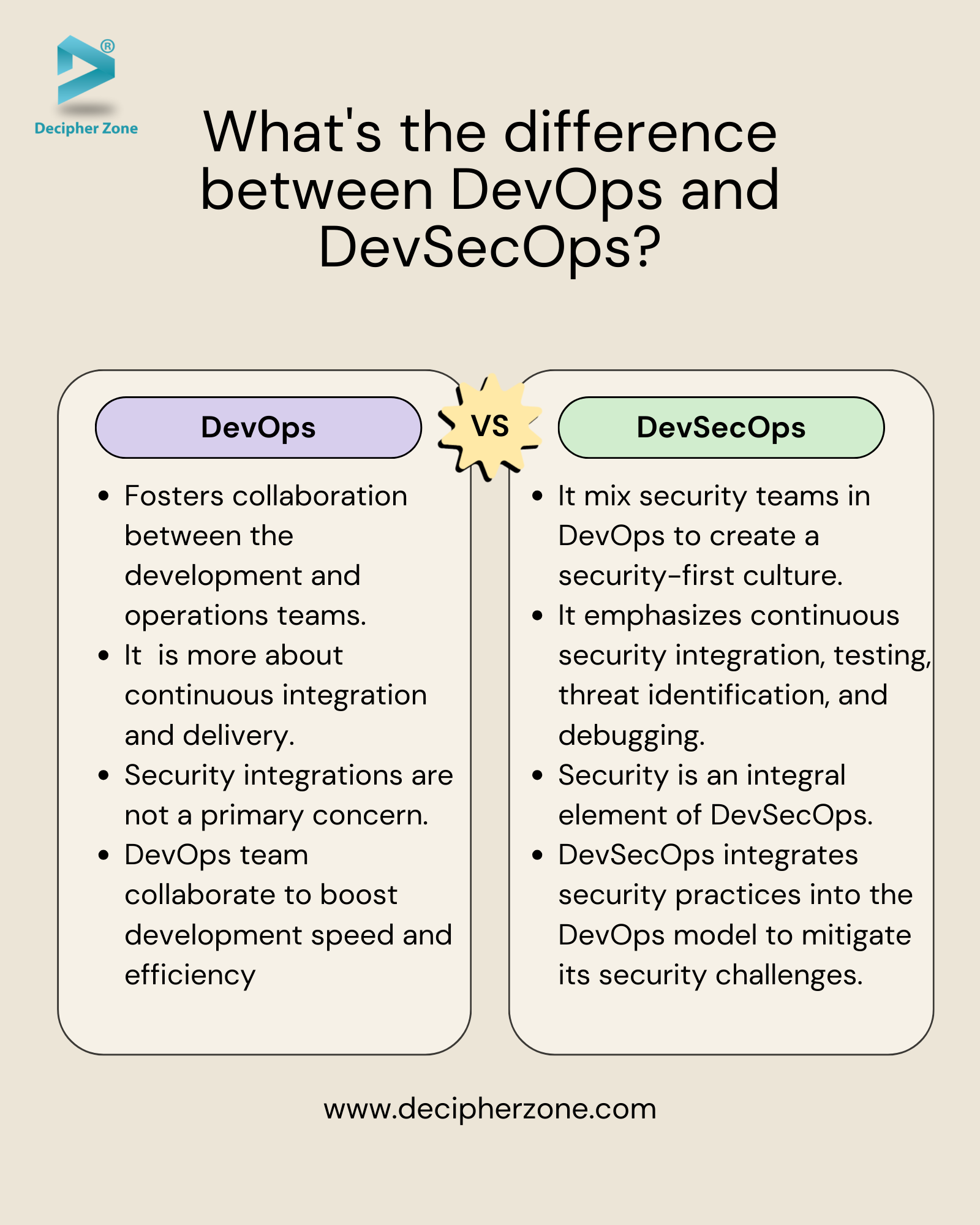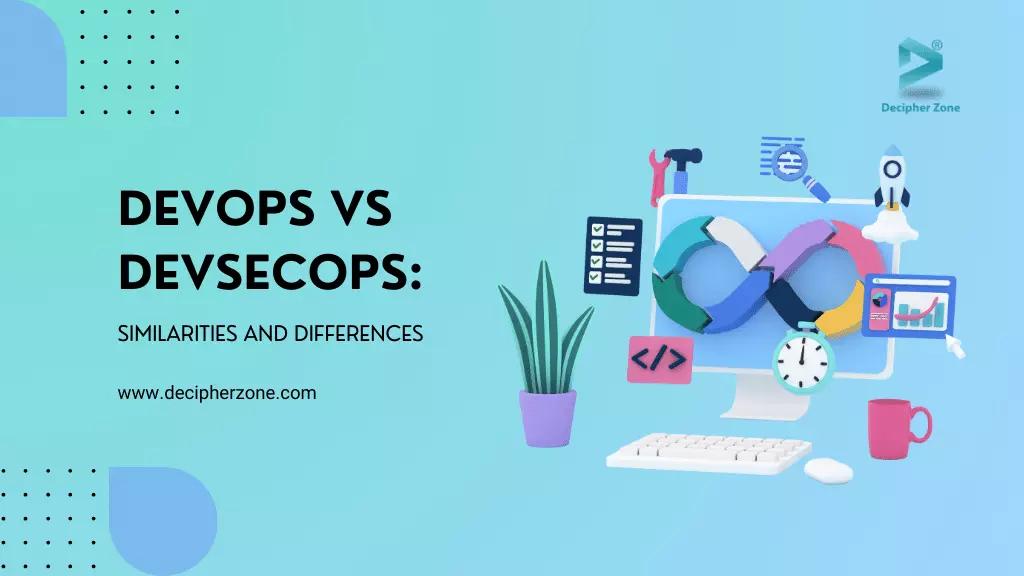DevOps vs DevSecOps: Similarities and Difference. Which should you go for? These two terms are continuously tossed around in the software industry by experts.
While both DevOps and DevSecOps are relatively new compared to other software development practices, they have gained traction over the years due to increasing demand for more efficient and quick development and delivery of quality software.
While the aim of both approaches is the same, i.e., delivery of high-quality software, there are significant similarities and differences that you need to consider before opting for one of them. To help you, we will explore everything from definitions and benefits to the similarities and differences of DevOps and DevSecOps. So, without further ado, let’s dive right into it.
Read: Top 10 Best CI/CD Tools For DevOps
Defining DevOps
The term DevOps comprises Development and Operations. It is a software development methodology combining cultural philosophies, tools, and practices to quickly improve the organization’s ability to deliver services and projects. It does so by leveraging collaboration, automation, testing, monitoring, feedback, and iterative improvement.
DevOps follows four core principles as follows:
-
Automating software development lifecycle processes such as build, release, testing, and other manual tasks usually slows down the software development process.
-
Apart from automation, effective collaboration and communication are the cornerstone of a successful DevOps team.
-
Another core principle behind DevOps is continuous improvement, making it crucial for teams to focus on creating better products through regular features and security updates.
-
To bring value to the customer, the last DevOps principle is to keep real users and their requirements in mind. This allows the DevOps team to make informed decisions that ultimately benefit customers.
-
Although it can be challenging to understand the user's perspective, a simple way to do that is through a short user feedback loop, which helps to identify and improve what's needed.
How Does DevOps Work?
The DevOps team consists of developers and the IT operations team who work collaboratively to deliver high-quality software faster than traditional software development methodologies like Waterfall.
These teams are no longer siloed in DevOps as they merge into one cross-functional team working together from planning and development to testing, deployment, and monitoring.
Read: Challenges in DevOps Adoption and How to Overcome Them
The DevOps approach focuses on automation, collaboration, and continuous feedback. It involves a pipeline that starts with writing code, followed by testing, debugging, updating, and planning during the development phase.
The pipeline then continuously iterates through release, deployment, configuration, management, and monitoring in the operation phase.
Some of the popular tools that streamline different phases such as discover, plan, build, test, monitor, operate, and continuous feedback are Jira, Confluence, Slack, Docker, Kubernetes, Ansible, Terraform, GitHub, Jenkins, AWS, Synk, VeraCode, Splunk, GetFeedback, and AWS CodePipeline.
Defining DevSecOps
DevSecOps, short for Development Security and Operations is a software development methodology that focuses on incorporating security measures in addition to combining development and operations at every level of SDLC.
It aims to deliver secure and reliable software while still keeping the development process faster and customer-centric. Rather than treating security as an afterthought, DevSecOps integrates it from the early stages of development to address exhorting security concerns that arise in DevOps.
How Does DevSecOps Work?
In traditional development models, integrating security and testing was a completely separate process. Security issues were the last to be addressed. However, the DevSecOps method works by identifying vulnerabilities throughout the development and delivery process of the software.
Successful implementation of the DevSecOps model requires continuous code analysis, change management, compliance management, threat modeling, and security training.
Some of the common DevSecOps tools used by the software development team to evaluate, identify, and report errors and vulnerabilities during development are Software Composition Analysis (SCA), Static Application Security Testing (SAST), Dynamic Application Security Testing (DAST), and Interactive Application Security Testing (IAST).
Read: DevOps Engineer Roadmap 2024
Similarities Between DevOps and DevSecOps
Although both DevOps and DevSecOps have different priorities, they share some likenesses that you must know about. Some of the pivotal similarities between these two are as follows:
-
Similarities in Culture: Both methodologies aim to bring different teams together through collaboration and regular communication to break down barriers, improve the development process, reduce bottlenecks, and improve efficiency. Not only that but DevOps and DevSecOps also have the same prioritization for continuous feedback, testing, and improvement, enhancing overall team productivity.
-
Focus on Automation: To reduce human errors while freeing the team from doing tedious and repetitive manual tasks, both models encourage automation that comes with continuous integration, delivery, and deployment workflow. In DevOps, automation is more focused on the feedback loop between developers and operations team members for faster deployment, while in DevSecOps automation aims to secure processes, reducing human errors and overhead costs.
-
Active Monitoring: For both DevOps and DevSecOps, active monitoring plays a crucial role as it allows the team to keep track of code and check whether it’s working as expected. The DevOps team monitoring is more concerned with keeping up the quality from the initial stages whereas the purpose of monitoring is more related to internal and cloud security in the DevSecOps model. Also, in both methods, monitoring is a foreseeing process instead of a reactive one.
Read: Essential Skills to Look for in a DevSecOps Engineer

DevOps and DevSecOps Differences
Now that we know the similarities between DevOps and DevSecOps, it’s time to dive into the factors that differentiate them from each other.
-
DevOps fosters collaboration between the development and operations teams while DevSecOps requires collaboration among the development, operations, and security teams to create a security-first culture.
-
While DevOps is more about continuous integration and delivery, DevSecOps emphasizes continuous security integration, testing, threat identification, and debugging.
-
Security integrations are not a primary concern in DevOps, however, it is an integral element of DevSecOps in every phase of the development lifecycle.
-
Developers and operations teams collaborate to boost development speed and efficiency in DevOps, on the other hand, DevSecOps integrates security practices into the DevOps model to mitigate its security challenges.
-
Last but not least, DevOps increases deployment frequency without compromising the quality or performance of the application, whereas, DevSecOps secures applications with the industry's soundest security tools and techniques while carrying DevOps advantages.
Wrapping it up
If you are thinking DevSecOps will replace DevOps in the long run, you’re wrong. DevSecOps is not here to replace DevOps practices, rather it will help expand the security, reliability, and quality of the software developed using the DevOps methodology.
Read: Tips for a Smooth DevSecOps Transformation
In conclusion, we all can agree that opting for either DevOps or DevSecOps absolutely depends on your unique business requirements and objectives. Both models provide different advantages while working on the same goal of reducing team siloes, improving collaboration, revving the development process, and delivering quality products.
If you are unsure whether to go for DevOps or DevSecOps for your next project, then contact our experts today! They will analyze your requirements, have a discussion with you for further details, and share a customized quote with you that meets your goals.

